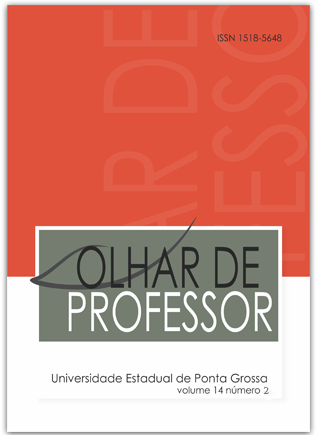Educação ambiental na perspectiva da educação inclusiva - DOI: 10.5212/OlharProfr.v.14i2.0005
Main Article Content
Abstract
O presente trabalho aborda a articulação da Política Nacional de Educação Ambiental com a Política Nacional de Educação Especial na Perspectiva da Educação Inclusiva, a partir de experiência do Laboratório de Educação Ambiental Inclusiva (LEAI), proposto pela Fundação de Articulação e Desenvolvimento de Políticas Públicas para Pessoas com Defi ciência e Pessoas com Altas Habilidades no Rio Grande do Sul (FADERS), órgão responsável por coordenar e articular projetos e ações direcionadas a essa parcela da população. De acordo com os dados do Censo Demográfi co de 2010 do Instituto Brasileiro de Geografi a e Estatística (IBGE, 2010), aproximadamente 45 milhões de brasileiros declararam possuir alguma defi ciência, o que signifi cou um salto de 1,41% em 1991 para 14,5% da população em 2000, chegando a 23,9% em 2010. Objetivamente, nossos trabalhos buscaram primeiro refl etir sobre a necessidade de diálogo entre inclusão, acessibilidade, sustentabilidade e direitos humanos, e atuar na construção de mecanismos que possibilitassem ações práticas, tendo atendimento, capacitação e pesquisa como eixos centrais. A partir disso, procuraram analisar a relação acessibilidade – sustentabilidade no contexto da garantia de direitos humanos, como ferramentas de construção de políticas públicas inclusivas e também sustentáveis.
Downloads
Article Details
Authors who publish in this journal agree with the following terms:
a) Authors keep the copyrights and concede the right of its first publication to the magazine. The work piece must be simultaneously licensed on the Creative Commons Attribution License which allows the paper sharing, and preserves both the author identity and the right of first publication to this magazine.
b) Authors are authorized to assume additional contracts separately, to not-exclusively distribution of the paper version published in this magazine (e.g.: publish in institutional repository or as a book chapter), with the author identity recognition and its first publication in this magazine.
c) Authors are permitted and stimulated to publish and distribute their papers online (e.g.: in institutional repository or on their personal webpage), considering it can generate productive alterations, as well as increase the impact and the quotations of the published paper.
d) This journal provides public access to all its content, as this allows a greater visibility and reach of published articles and reviews. For more information on this approach, visit the Public Knowledge Project, a project that developed this system to improve the academic and public quality of the research, distributing OJS as well as other software to support the publication system of public access to academic sources.
e) The names and e-mail addresses on this site will be used exclusively for the purposes of the journal and are not available for other purposes.

This work is licensed under a Creative Commons Attribution 4.0 International License.





